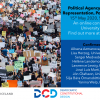Participatory budgeting was first practiced in Brazil in 1989 as a means of democratising the finances of a city government and creating more accountable governance. Citizens deliberate on how resources should be allocated and what spending priorities are, rather than this process being dominated by elected politicians who can be beholden to other interests, or technocratic council officers who can be far removed from the situation on the ground.
The method was pioneered by the city of Porto Alegre, a relatively prosperous city in Brazil, initiated by the centre-left Workers’ Party. The party’s aim was to initiate an ‘inversion of spending priorities’. Historically, public resources had been disproportionately spent on wealthier neighbourhoods. Participatory budgeting was envisioned as a mechanism for helping poorer citizens and wards receive larger shares of public funding, by inviting citizens themselves to debate what the priority issues of the city were and how money should be spent.
Different approaches practiced across the world seek either to get a demographically accurate sample of citizens, or to have greater representation of specific groups to feed into the development of decisions disproportionately affecting minority populations. Common to other forms of engagement, participatory budgeting can have the same issues of the “usual suspects” being overrepresented or dominating debates. This can be mitigated with sampling and trained moderators, allowing all participants ample time to express their views.
Communications, marketing, and embeddedness in the political process are important for the success of participatory budgeting. When done well, studies show that it results in: a fairer allocation of public resources; greater perceived transparency, accountability, and trust in government; and an improvement in the participation of marginalised citizens. It has also been shown to improve the outcomes and living conditions of the poorest citizens, and innovative ideas submitted by citizens can create real change. However, there can be problems with participatory budgeting. Tensions can arise owing to the design, process, implementation, or surrounding policies and institutions that have not been designed to accommodate this mechanism. This can lead to political opposition.
Nevertheless, experiences across the world show us that participatory budgeting has a transformative power that can help engage with hard-to-reach groups and co-produce holistic responses to the challenges they face.

Participatory budgeting originated in Porto Alegre and has since spread to hundreds of cities across the world. At its peak, the city devolved responsibility for spending £130 million. Tens of thousands of citizens took part. The process comprised three layers: neighbourhood assemblies in 16 wards, thematic assemblies by department of the municipality, and meetings of delegates elected by the neighbourhoods to attend coordinating sessions with the council.
The experience has been widely viewed as a major success, in terms of redistributing spending to areas that are in greater need, improved outcomes on a range of metrics, and greater inclusion of women, ethnic minorities, and those with low incomes and low education in political processes. However, in 2017 the centre-left Workers’ Party lost the city, and new conservative leadership suspended the process. Participatory budgeting had become increasingly unpopular with politicians, particularly among those on the right. This highlights the challenges in changing institutional culture and the power dynamic that exists in civic engagement, where those in the position of power can end initiatives that they perceive to be a threat to their authority. A similar situation happened with Britain’s NHS Citizen initiative, which was set up in 2012 to integrate a deliberative system into formulating health policy but was shut down, being perceived as a challenge to decision-makers.
Participatory budgeting in Porto Alegre lacked a mechanism for incorporating citizens’ views into long-term planning and was beset by issues of short-termism and a focus on smaller issues. Nevertheless, research has found that over the lifetime of the participatory budgeting process, the city’s development level rose significantly above comparator cities and poorer neighbourhoods achieved much higher levels of public investment per head than had previously been the case. It also benefited city officials, who had struggled to make unpopular decisions. Instead, citizens were confronted by the trade-offs required and sought to negotiate solutions that were more acceptable to them and their neighbours.

Portugal is the first country to try participatory budgeting on the national level, drawing from the success of this policy in the capital of Lisbon since it was launched in 2008. In the 2016/17 financial year, €2.5 million was allocated; a tiny fraction of the city’s overall budget, and much smaller than the sums involved in Porto Alegre. The city announced its intention to ‘de-digitising’ its participatory budgeting in favour of face-to-face methods, which it speculates could better reach groups such as young people, seniors, and migrants. It is likely this will have to wait until after the pandemic.
Lisbon’s experience has been described as a ‘slow but continuous transformation’. This slowness could be its strength, as it has avoided the conservative backlash that occurred in other trailblazers. Lisbon’s approach differs in that it does not place a special emphasis on issues relating to social inclusion, wealth redistribution, and specifically improving outcomes among the most marginalised groups. This could also be a reason for less political opposition.
A recent development in the city is a new Green Participatory Budget, where citizens can decide on how funds are allocated to help deal with the green energy transition and building resilience in the face of climate change. This is a good example of building support for participatory budgeting through a policy area where there is widespread agreement that something needs to be done. Similar work in the UK and USA might also begin with a response to climate change or protecting the environment, where polling shows a high degree of consensus among the public that is not reflected in politics.
Participatory budgeting is a powerful tool but one that is fragile, as it depends upon widespread public involvement and the support of political actors. Cuts in funding or rolling back of policy areas covered can undermine the legitimacy of the process in the public’s eyes. Nevertheless, the experience of Lisbon has built the evidence base for participatory budgeting and shown how this is a method that can evolve over time in a positive feedback loop.





















